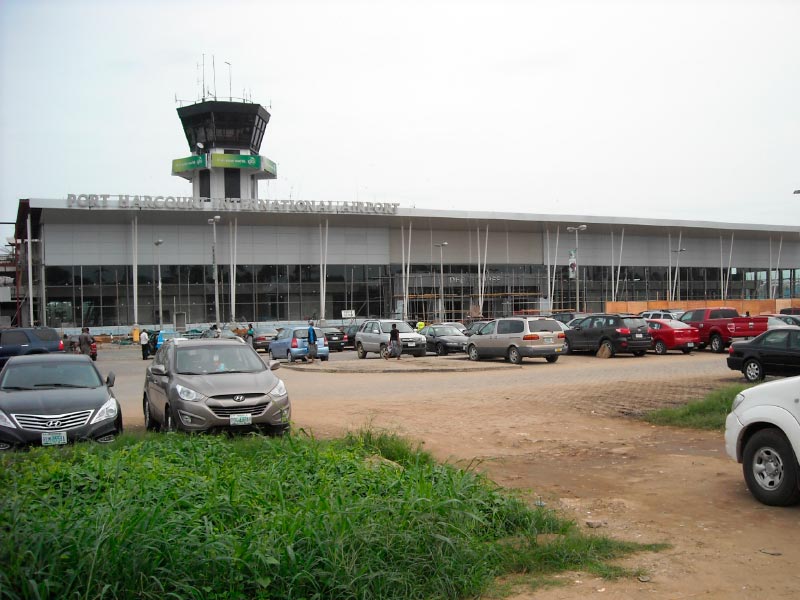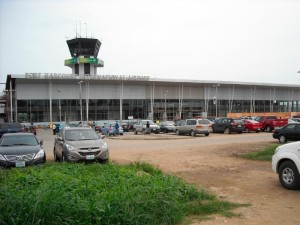
 The purpose of boarding a flight is basically for safety and of course the need to save time and energy, but theses aims appear on the decline in Nigeria judging by the ordeal commuters go through. Flight delays have become a norm. Thus it is no longer dependable to book a flight in a bid to meet up with emergency.
The purpose of boarding a flight is basically for safety and of course the need to save time and energy, but theses aims appear on the decline in Nigeria judging by the ordeal commuters go through. Flight delays have become a norm. Thus it is no longer dependable to book a flight in a bid to meet up with emergency.Imagine a situation where passengers get caught in the rain and were soaking while they tried to pass their luggage through the scanner right at the entry to the airport’s lobby or a worst case scenario where passengers have to fold their trousers and any long dresses immediately after disembarking from the plane because the airport is flooded due to rain.
An angry passenger once decided to air his grievance by blocking the runway of the Nnamdi Azikiwe Airport, Abuja. According to report, the Arik flight from Abuja to Sokoto was scheduled for 8a.m. but was cancelled with no prior notice.
A bombardier Q400 aircraft was later provided to fly them to Sokoto by 1pm but as they boarded, the pilot announced the plane had a snag so he disembarked the passengers. That was when the passengers lost their cool and went haywire. They prevented three Arik aircraft from taking off. Some sat on the foot of the Aircraft blocking Benin passengers from boarding. No management of Arik airline was available to address the enraged passengers which made matters worse.
This and many more anomalies have become a norm in and around local and international airports in Nigeria. The picture of a flooded Enugu international airport, which took over the social media in 2014 says just little about the airport, which was said to be recently renovated.
The issues relating to Nigerian airport is not only about physical infrastructure but also those of security, timeliness, professionalism and other issues relating to breech of protocols by individuals with either political or financial clout. One of such cases of breeched protocol was when former First Lady, Dame Patience Jonathan tried to approach the foot of aircraft with her convoy of vehicles, during boarding formalities. Although she was denied, there are many similar cases where airports and flight operators breech protocol to favour some individuals.
Furthermore, there have been several cases where passengers narrowly escape death either due to negligence or professional ineptitude. There was an incident at the Murtala Muhammed International Airport, Lagos where a tanker laden with 33, 000 litres of aviation fuel skidded and emptied its content on the road at about 10.00a.m.
According to the witness, the tanker fell when the driver wanted to navigate the sharp bend around the airport. It took massive effort from fire service to avert a fatal inferno. A recent study carried out by Federal Airport Authority of Nigeria (FAAN) indicated that if explosion occurred around the airport caused by the highly inflammable vehicles, it would consume thousands of lives while unquantifiable collateral damage would be done to property both at the airport and adjoining areas as the airport facility is located very close to highly populated communities.
Little wonders recent survey shows that no Nigerian airport was rated amongst the top 20 in the world. Changi International Airport, Singapore once again topped Sleeping in Airports world’s best list.
The best airport in the world boasts of an aviation terminal that comes with a fish spa, a sauna, a butterfly garden, showers, a koi pond, a multi-story slide, a gym and a free movie theatre. “Voters are quick to liken time spent here to a five-star hotel that they are sad to leave, even after 22 hours inside it,” said the site.
The Haneda International Airport in Tokyo, Japan is admired by travellers for being tidy, efficient, modern and generally just really pleasant, said Sleeping in Airports. One major edge it has over other airport is that it connects to the city center in roughly 45 minutes by public transport.
Airports like Incheon International Airport Seoul, South Korea also earns adoration from travellers by offering up free showers, ultra-fast free Wi-Fi, plenty of comfortable seating and impeccable service.
Kloten International and Kuala Lumpur Airport in Switzerland and Malaysia were also among the top rated due to their precise, efficient tidy, and impeccably clean surroundings make it a calm and soothing place to navigate.
Unlike most airports in Nigeria, the Kuala Lumpur airport main terminal received high marks for being clean, spacious, comfortable and organized. There are plenty of restaurant and shopping options as well as free Wi-Fi.
The Vancouver International Airport, Canada was described as ultra-welcoming, thoughtfully designed, extremely comfortable and fantastically friendly. The major highlights at Vancouver International Airport include the giant aquarium in the international departures lounge, dozens of art and museum exhibits, self-guided tours and a decent variety of shops and restaurants.
Other developed airports in the world are characterized by developmental trends and new innovations to enhance better services.
The Helsinki International Airport was described as innovative and transit-friendly. This year it was their introduction of sleep pods in March that really generated the most positive feedback, according to respondents.
The Munich international airport in a similar vein is efficient, speedy and impressively organized layovers are delightfully straightforward and reliable. This precise terminal is not without their comfort and frills either. Also, the airport has its own brewery, spa, casino, cinema and mini-golf course.
While the Hong Kong International Airport was praised by voters for its diverse list of amenities, including gardens, sleep rooms, spas and showers within a naturally light and airy space, the Akwa Ibom Airport Uyo, two years ago narrowly averted disaster due to sudden interruption in electricity supply to airport as an aircraft, with its landing gear fully engaged, was just about to land on the runway. Passengers on board would have experienced a devastating air accident had the American pilot not been vigilant enough to hurriedly terminate his landing plan and re-engage the engine to quickly fly back to the sky.
Also, the famous Nigerian Murtala Muhammed International Airport has also registered cases of collision of two aircraft apparently due to lack of spacious terminal couple with inadequate planning of aircraft movement. A source at the airport said one of the aircraft was taxiing from the runway to the terminal, for passengers to disembark while the other aircraft was preparing to take off to Port-Harcourt from the same terminal.
The source said the pilot may have been misdirected by the marshals who led the pilot to taxi to the wrong part of the apron.
This is usually the case in Nigerian airport as Port Harcourt International Airport was rated worst in the world by the survey. Respondents reportedly complained about unpleasant and unhelpful staff, alleged corruption, a severe lack of seating, broken air-conditioning and the fact that the arrivals hall was inside a tent. Although reports have it that some areas of the terminal have been recently renovated, it is far cry from reasonable according to the survey.
The fact that the Port Harcourt Airport was not on the list of worst airport last year shows things may have gone from bad to worse within 12 months.
Saudi Arabia’s Jeddah King Abdulaziz International Airport held onto its position as world’s second worst airport. The environment is said to be unclean, chaotic, crowded, particularly within the Hajj terminal. “From smoking in non-smoking areas to the bathroom odour wafting out into the lounges, few people sang praises after spending time here,” said Sleeping in Airports. “Multi-hour immigration queues with distracted and absent officers further aggravated travelers.” Fortunately, the site said Jeddah’s days on the list are likely numbered as the new Jeddah Airport is scheduled to open mid-2016.
Nepal’s Kathmandu Tribhuvan International Airport held onto the same position of third worst airport in the world as last year.
Last year’s worst airport, Benazir Bhutto International Airport in Islamabad, Pakistan, slipped to ninth place, while Tashkent International Airport in Uzbekistan rose a spot to move from fifth to fourth place.
Toussaint Louverture International Airport in Haiti is also reported to be characterized by sweltering heat, a lack of chairs and untrustworthy staff.
The Simón Bolívar International Airport in Caracas, Venezuela in a similar vein is also chaotic, uncomfortable and dull. More so, the absence of chairs and dirty bathrooms worsen the experience of travellers which also coupled with low quality of food.
The Portharcort international airport and few others made the list for the worst airports according to travellers apparently due to its physical conditions. Although Nigerian airport at this point may not be ready to compete with its counterpart in developed nation, there is need to meet up basic infrastructures like security, professional personnel, serenity and need to keep to time amongst other things that can make boarding a flight a bit more comfortable.
